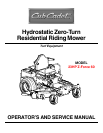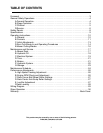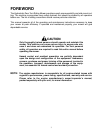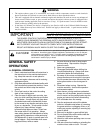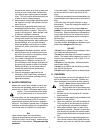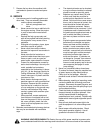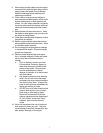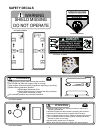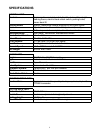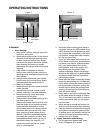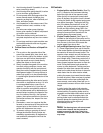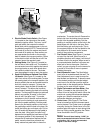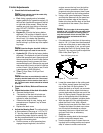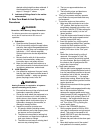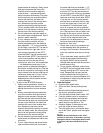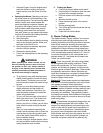
6
7. Remove the key when the machine is left
unattended to prevent unauthorized opera
-
tion.
D. SERVICE
1. Use extreme care in handling gasoline and
other fuels. They are extremely flammable
and the vapors are explosive.
a. Use only an approved con-
tainer.
b. Never remove fuel cap or add fuel with
the engine running. Allow the engine
to cool at least two minutes before
refueling.
c. Replace the fuel cap securely and
wipe off any spilled fuel before starting
the engine as it may cause a fire or
explosion.
d. Extinguish all cigarettes, cigars, pipes
and other sources of ignition.
e. Never refuel the machine indoors
because fuel vapors will accumulate in
the area.
f. Never store the fuel container or
machine inside where there is an open
flame or spark, such as a gas hot
water heater, space heater or furnace.
g. Prevent fire and explosion caused by
static electric discharge. Use only non-
metal, portable fuel containers
approved by the Underwriter’s Labora
-
tory (U.L.) or the American Society for
Testing & Materials (ASTM). If using a
funnel, make sure it is plastic and has
no screen or filter.
h. Static electric discharge can ignite
gasoline vapors in a non-grounded fuel
container. Remove the fuel container
from the bed of a vehicle or the trunk
of a car and place on the ground away
from the vehicle before filling. Keep
nozzle in contact with container open
-
ing while filling.
i. When practical, remove equipment
from trailers or truck beds and re-fuel
them on the ground. If this is not possi
-
ble, use a portable, plastic fuel con-
tainer to re-fuel equipment on a truck
bed or trailer.
2. Batteries are stored electrical energy devices
that may be serviceable with removable
caps.
a. The electrolyte levels can be checked,
or may be non-serviceable (no attempt
should be made to open the vents).
b. Batteries may contain lead (Pb) and
sulfuric acid, and they must be re-
cycled and not disposed of nor aban
-
doned. Sulfuric acid can cause severe
burns, and in the event of contact, the
areas should be flushed with water
and a physician contacted. Battery
cases should not be punctured. Lead
is poisonous and is contained within
the positive and negative terminals as
well as within the battery’s internal
grid-work of plates and active materi
-
als.
c. Explosive gases are generated when
batteries are re-charged, so sparks,
flames and heat sources should be
avoided. Loose connections at the
battery terminals can produce sprks
and heat...connections to the terminals
must be kept tight, and the terminals
and battery surfaces kept clean of
acids and corrosion. If batteries are
re-charged or “jumped” from external
sources, make sure that the connec
-
tions are made properly and in the cor-
rect sequence (see page 19 under
jump starting).
3. Never run a machine inside a closed area.
4. To reduce fire hazard, keep the machine free
of grass, leaves or other debris build-up.
Clean up oil or fuel spillage. Allow the
machine to cool at least 5 minutes before stor
-
ing.
5. Before cleaning, repairing or inspecting, make
certain the blade and all moving parts have
stopped. Disconnect the spark plug wire, and
keep the wire away from the spark plug to pre
-
vent accidental starting.
6. Check the blade and engine mounting bolts at
frequent intervals for proper tightness. Also
visually inspect blades for damage (e.g.,
excessive wear, bent, cracked). Replace with
blades which meet original equipment specifi
-
cations.
7. Keep all nuts, bolts and screws tight to be
sure the equipment is in safe working condi
-
tion.
8. Never tamper with safety devices. Check
their proper operation regularly. Use all
guards as instructed in this manual.
WARNING-YOUR RESPONSIBILITY: Restrict the use of this power machine to persons who
read, understand and follow the warnings and instructions in this manual and on the machine.



